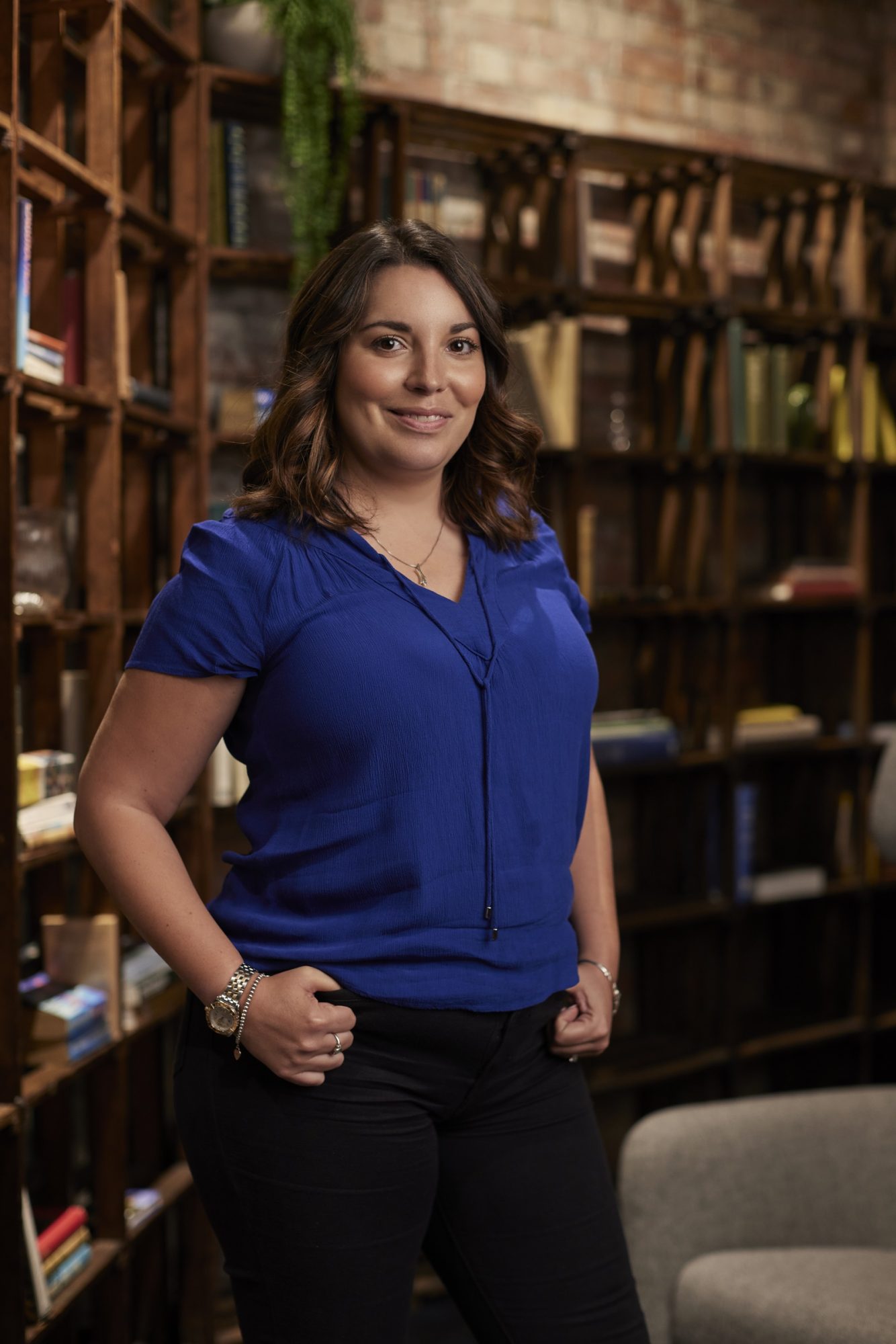
Interviews 01.11.2022
Getting to Know: Stephanie Lopes
Eleanor Dallaway meets commercial tech lawyer extraordinaire Stephanie Lopes…

Interviews 01.11.2022
Eleanor Dallaway meets commercial tech lawyer extraordinaire Stephanie Lopes…
She was greeted by a warm, impressive and very smiley Steph who gave her the lowdown on making general counsel, gender discrimination in negotiations and how to “avoid the lawyer ivory tower”…
Introducing Stephanie Lopes by her job title would do her somewhat of a disservice. As impressive as it is for her to have made general counsel at an enviably young age (33), it’s not even the most impressive thing about her.
What is, then? I hear you ask. All will become clear as you read on, but her demeanour, her passion for mentorship and her emotional intelligence top the list for me.
Just over a year ago, Stephanie Lopes flew the Bird & Bird nest (excuse the pun) to join real-time payment firm Volt as their General Counsel. It was the end of a decade-long era with the international law firm that specialises in all things tech and digital that took Stephanie under its wing (excuse another pun) in her second year of university.
The decision to leave was not one she took lightly. “It was such a hard decision,” she recalls. “I was progressing well, had much support, great training, and good friends at all levels.” She notes that one of her earliest mentors became the CEO. “I was given so many opportunities and trained so well.”
From the graduate programme she joined during her university days, to the funded legal practice course, to the two-year training contract, qualification and offer of a permanent job, Stephanie speaks positively, no, glowingly, about her entire journey at Bird & Bird.
of a permanent job, Stephanie speaks positively, no, glowingly, about her entire journey at Bird & Bird.
From qualification, Stephanie started working her way “up through the ranks.” At first glance, giving a decade – and a formulative one at that – to one company could be perceived as
career-limiting. The reality is that half of that decade was spent being seconded to various organisations, including the Bank of England, BAE Systems, ABB and Nestlé.
Stephanie appreciates the value of secondments. “You can become very lawyer-ey, sat in your ivory tower in private practice, but once you’ve gone into a business, you become a much better commercial and business lawyer because you better understand the pressure everyone is under.”
You’ll likely be unsurprised to learn that the Bank of England earns the much-coveted title of ‘best secondment’ for Stephanie. It was also responsible for giving her that “I’ve actually made it moment” every time she walked into the building. “It was a fascinating institution to work in, and amazing to work amongst the grandeur.
“Every time I walked into that amazing building, I’d say to myself, ‘wow, this is very cool, I’m actually contributing to this!’” She credits what she describes as an incredibly hard-working, excellent team. “I had a great boss there. He was a brilliant, wonderful lawyer committed to building his team up. I learnt an awful lot from him,” Stephanie recalls.
Another secondment she looks back on fondly came from her (now) husband getting a job in Switzerland. Who says you can’t move to Switzerland with your partner and simultaneously keep the job you love? Bird & Bird didn’t miss a beat. They arranged a secondment at Nestle’s IT law department in Switzerland, focussing on GDPR and cybersecurity law.
Switzerland was a welcome chapter in her life for a woman who loves to travel. Of course, the part where an air ambulance was called on an unsuccessful attempt to ski makes the reels, but not the highlights. “I don’t know whether I was just unlucky or Calamity Jane, but it put me off. I learnt to toboggan instead,” she laughs. This is not the only time that bad luck comes into our conversation. Steph also divulges that a horrendous bout of food poisoning stopped her from doing a year abroad in either Hong Kong or Australia as part of her law degree.
It’s probably time to take it back to the start and consider how Stephanie, an am-dram-loving teenager, ended up in law school. “It’s not that I like arguing; I’m not argumentative for the sake of it,” laughs Stephanie, “but I like having a logical conversation with somebody and debating an issue, looking at it from an objective standpoint.”
She excelled in studying drama for GCSE, finding a passion for monologues, and debating sessions. “I was always confident as a child; I loved dancing before I got into musical theatre.” At the age of 16, Stephanie impressively achieved a LAMDA bronze award, “but I didn’t take it any further because I got busy with A-levels and at this point decided I wanted to be a lawyer.
“I didn’t have time for the drama. I still don’t…in any sense of the word!” she laughs.
As the first-generation university go-er in her family, Stephanie was walking in nobody’s footsteps when she decided to study law at Warwick University. She focused on commercial law, taking every commercial business-focused module she could. “I’ve always been interested in business.” Later in the interview, Stephanie describes herself as a business-focussed lawyer, as opposed to a “pedantic, ‘letter of the law’ lawyer. I hope my colleagues would view me in the same way,” she adds, stating the importance of getting commercial reality into discussions. “I like to get to that perfect business deal that meets both parties’ expectations of what they can achieve.”
Stephanie confirms that this sweet spot is where her job satisfaction lies. “Every business deal has a trade-off, everyone has things really important to them, and it’s about finding the balance because if you have one side that wins every point, and the other side feels like they’ve not got a good deal, how will that relationship move forward? One side will always have a chip on their shoulder.”
“You can become very
lawyer-ey, sat in your ivory tower in private practice”
Her migration to Volt fulfils her passion for getting closer to the business. She didn’t go looking for the role, but more, it landed in her lap. “Volt was one of my clients at Bird & Bird, and I led that relationship from the associate side. Tom (the Volt CEO) kept asking me when I’d join his company as general counsel.” The pandemic – and thus the desire for a new challenge – gave Stephanie the motivation she needed to take the leap.
She describes the role of general counsel as the “equivalent to being made a partner in private practice” but adds that it has the added benefit of bringing you so much closer to the business. “I sit in all the management meetings,” she says, which is a massive bonus to someone as passionate about business as Stephanie. As a regulated business serving the UK, Europe and Brazil, she finds herself balancing different regulators and requirements, confessing she is learning new things daily. Employment law, for example, is a new area for her. “There’s never a dull day,” Steph says, adding that she believes her move to Volt has progressed her both as a lawyer and a commercial businessperson.”
Despite raving about her new focus on business, Stephanie doesn’t see herself stepping away from the law now, nor ever. “I really enjoy law, and I’ll always fall back on it,” she says. Besides, her risk-averse nature, which she says is inherent in most lawyers, means “I’m a bit too risk-averse to go into pure business.”
I’m unsure whether this self-assessment is fuelled more by mature self-awareness or modest self-criticism. Given the competence that Stephanie exudes, I suspect it’s the latter. This leads to our conversation about imposter syndrome. Is this something that Steph suffers from? “All the time,” she admits. “Especially recently. I have these moments when I think how on earth am I the general counsel of an organisation growing this fast, and this successful?
“One of the companies that I saw bridging that gap most effectively is one that had a CISO who could get down and dirty with the techie infosec guys but also knew how to relate everything to the business and speak the language of the board”
“Perhaps it’s a female trait,” Stephanie ponders. “I reckon a man would just back himself,” she says. “But if you do so much work on yourself that you completely shrug that feeling off, have you just become arrogant?” She belongs to networks swelling with successful women and leans on these.
I take this opportunity to ask a question that is on the tip of my tongue, but I’ve waited to assess how it might land: Has your gender ever affected your career? There’s a weighty pause while Stephanie considers this. “It hasn’t, but I was lucky with where  I was trained.” She adds that there are many women in the senior leadership team at Bird & Bird and a strong internal desire to bring women up through the ranks.
I was trained.” She adds that there are many women in the senior leadership team at Bird & Bird and a strong internal desire to bring women up through the ranks.
While she hasn’t faced discrimination from an employer, there have been times when Stephanie is
sure that she hasn’t been taken seriously in client negotiations because she’s a woman. “I’ve had some very difficult negotiations where I’ve been talked down to and belittled. I’ve had to accept I’m not getting anywhere and had to ask one of the other (male) senior associates or partners to step in because I’ve recognised it wasn’t going well.” My jaw is practically on the floor as Stephanie continues, “and then suddenly a man steps in and they’ll have a proper conversation.
“It makes me feel bad because I wonder whether I got the best outcome for my client. You can’t
lose out for your client [purely because of gender] due to someone’s attitude on the other side.” She talks about the guilt she’d feel had she been “pig-headed enough” to continue herself. It’s tragic that she’d even consider insisting on doing her job as “pig-headed”, but it’s a credit to her that she had the emotional intelligence to put her client first.
“As a senior associate, despite there being partners in the room, I would often be asked to lead negotiations, but I’d have the awareness to step back if I detected we weren’t getting anywhere because I’m a woman.” She recalls that she was often supported by others in the room who saw straight through the sexism and called it out. “They were strong, experienced men that did this, and they didn’t need to care whether the other people in the room liked them.”
Stephanie’s emotional intelligence and maturity impress me enormously. It occurs to me that emotional intelligence must be one of the most essential and desirable traits for a lawyer, and there’s no doubt that she has it in abundance.
Stephanie’s final thought on women in law: “As a woman, you have to be a log stronger than a man who naturally has that male energy and presence. [Men] automatically get respect from other men, but women have to push that little bit harder to get their point across.”
Speaking of working to get a point across, I ask Stephanie whether, as a commercial technology lawyer, she has any opinions on how educated boards are when it comes to cyber risk. “The organisations that had the best awareness were those where you had an intermediary between the tech department and the business-focussed board.
“You get incredibly techie and knowledgeable people who can’t translate cyber risk into how it affects the business.” So who is responsible for bridging this communication gap between business and tech?
“It’s a good question,” she smiles, admitting that she doesn’t have the answer. “I’ve seen people using the legal department as a way into the board, preaching that cyber needs to be brought into the business strategy because if it goes wrong, it could really throw your whole business off course.” She doesn’t necessarily endorse this, however. “One of the companies that I saw bridging that gap most effectively is one that had a chief information security officer (CISO) “who could get down and dirty with the techie infosec guys but also knew how to relate everything to the business and speak the language of the board.”
She considers that boards are often afraid to say, ‘sorry, I didn’t quite get that.’ “They’re afraid to stand up in front of the rest of the board and admit they didn’t understand a word the CISO said.”
It’s a problem we at Assured are all too aware of, and a challenge that we’re founded to try and overcome.
Before I ask Stephanie what she’s most proud of, I try to guess what her answer will be. Making general counsel in the better half of her thirties? Working at the Bank of England? While she contends that there is so much she is proud of, there’s one that stands out: “Training up the juniors.
“I put so much effort into bringing people up with me. It would be easy,” she considers, “when you’re working until midnight, to say ‘if I do it myself, it will be quicker,’ but then how does that person ever learn?” She considers it giving back, having been the recipient of career-defining mentoring thus far. “I’ve actually helped to contribute to others’ careers, and that’s excellent. I could answer with a million and one projects I am proud to have worked on, but seeing those I helped succeed tops them all.”
So what’s next for this firecracker who has already achieved so much? “I’m enjoying not being in private practice,” Stephanie says. “I like being that much closer to the business, so my next step will be general counsel, leading a commercial technology team in an even bigger company. But for now, I love what I’m doing, and I’m learning an awful lot.”
It’s a good job she adores what she do es because she confesses she often works around the clock. “That’s just the nature of the law profession,” she shrugs, “you have client demands, and when there are deadlines to be met, then deadlines have to be met.” She attributes this (with sadness) as the reason that there’s a notable drop-off in women leaving the sector once they start a family.
es because she confesses she often works around the clock. “That’s just the nature of the law profession,” she shrugs, “you have client demands, and when there are deadlines to be met, then deadlines have to be met.” She attributes this (with sadness) as the reason that there’s a notable drop-off in women leaving the sector once they start a family.
When she’s not working every hour under the sun, you’ll find Stephanie hopping on a plane (or in the car) to indulge in as many new cultures as possible (Japan is her favourite country). She loves to travel, and what’s more, she loves to cook in the countries she visits. Between her tenures at Bird & Bird and Volt, she drove to Italy with her husband: “We took the Eurotunnel and drove down to Tuscany to pick up a load of nice food and wine.”
It strikes me that this Italian road trip has many parallels with her career journey thus far. She had a known and desired destination, she got there in a way that was agreeable to her, she enjoyed the things she encountered along the way, and she picked up items that would be useful to her in the future. Stephanie is already planning her next travel, which again strikes me as poetic: this general counsel has a hell of a career journey ahead of her, and I know she will enjoy the ride.